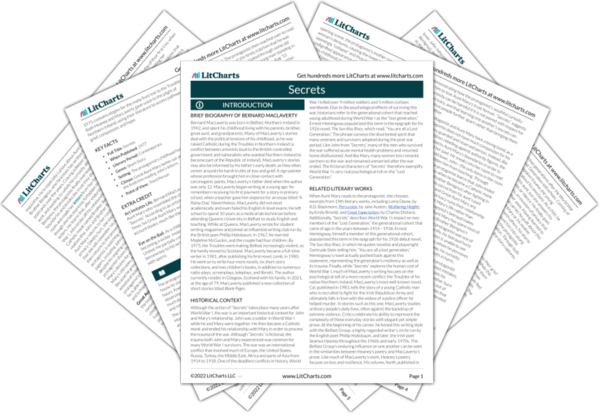“Secrets” explores the far-reaching devastation of World War I, detailing the war’s repercussions not only for the generation that fought in it, but also for generations to follow. When the protagonist reads Aunt Mary’s letters, he realizes that she was in love with a soldier named John during the war, who later became a Catholic monk and changed his name to Brother Benignus. Having reached young adulthood during World War I, both Brother Benignus and Mary are members of what historians call the “Lost Generation,” and both are psychologically scarred by their experiences. The four letters the protagonist reads from John reveal that, like many other members of his generation, the horrors John experienced on the battlefield deeply transformed him. Although John seems hopeful about the future in the first letter the protagonist reads, by the third letter, he describes the horror and anguish of watching his fellow soldiers die, writing, “if I live through this experience, I will be a different person.” Thus, while he physically survived the war, he was so mentally altered by it that Mary implies that he was, in a sense, killed in the war. His name change to Brother Benignus once he was ordained further implies that the pre-war John symbolically died. Mary also suffered a huge loss, as she had to give up the future she had hoped for with John when he became a monk. Scarred by the trauma of this heartbreak, Aunt Mary seems to have spent the rest of her life trusting no one and “keep[ing] mostly to herself.” Mary and John’s failed romantic relationship therefore demonstrates the deep pain and isolation that many members of the Lost Generation carried with them for the rest of their lives.
The protagonist grows up amid the reverberations of this pain, demonstrating how, even two generations after the World War I, the devastation of the Lost Generation still echoes. Coming of age around Aunt Mary’s unspoken trauma, the young protagonist learns not to talk about his emotions. As a child, he clearly craves connection with his aunt, but she answers his questions with evasive statements or silence. He finally goes behind her back to read her letters, an invasion of privacy that angers her and only drives her further away. Having learned to repress his emotions, the protagonist carries his guilt about this incident silently, never talking to Aunt Mary or his mother about it. Unable to process his feelings with others, his shame over a childhood mistake continues to haunt him into young adulthood. The story’s last scene, in which the protagonist weeps alone, symbolizes his emotional isolation. Through both Aunt Mary and the protagonist’s silent pain, the story captures the intergenerational trauma of World War I.
World War I and the Lost Generation ThemeTracker

World War I and the Lost Generation Quotes in Secrets
When he was bored he would interrupt her and ask about the ring. He loved hearing her tell of how her grandmother had given it to her as a brooch and she had had a ring made from it. He would try to count back to see how old it was. Had her grandmother got it from her grandmother? And if so what had she turned it into? She would nod her head from side to side and say, “How would I know a thing like that?” keeping her place in the closed book with her finger.
“Don’t be so inquisitive,” she’d say. “Let’s see what happens next in the story.”
He reached over towards the letters but before his hand touched them his aunt’s voice, harsh for once, warned.
“A-A-A,” she moved her pen from side to side. “Do not touch,” she said and smiled. “Anything else, yes! That section, no!” She resumed her writing.
“Who is that?” he asked.
“Why? What do you think of her?”
“She’s all right.”
“Do you think she is beautiful?” The boy nodded.
“That’s me,” she said. The boy was glad he had pleased her in return for the stamps.
“I thought maybe it was Brother Benignus,” he said. She looked at him not answering.
“Was your friend killed in the war?”
At first she said no, but then she changed her mind.
“Perhaps he was,” she said, then smiled. “You are far too inquisitive. Put it to use and go and see what is for tea.”
My love, it is thinking of you that keeps me sane. When I get a moment I open my memories of you as if I were reading. Your long dark hair—I always imagine you wearing the blouse with the tiny roses, the white one that opened down the back—your eyes that said so much without words, the way you lowered your head when I said anything that embarrassed you, the clean nape of your neck.
The only emotion I have experienced lately is one of anger. Sheer white trembling anger. I have no pity or sorrow for the dead and injured. I thank God it is not me but I am enraged that it had to be them. If I live through this experience I will be a different person.
I have been thinking a lot as I lie here about the war and about myself and about you. I do not know how to say this but I feel deeply that I must do something, must sacrifice something to make up for the horror of the past year. In some strange way Christ has spoken to me through the carnage.











